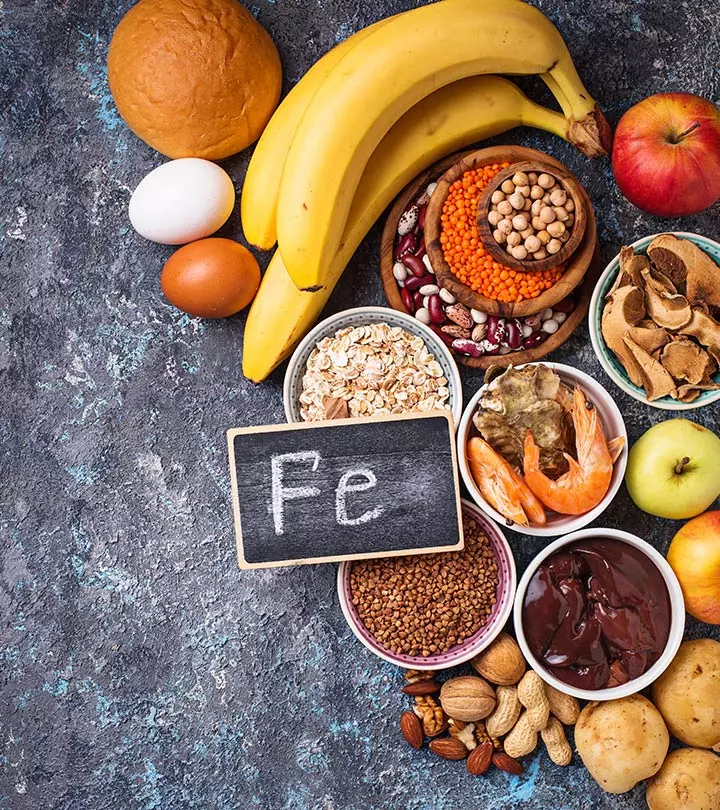
Image: Midjourney/ MomJunction Design Team
A child’s linear growth depends on their genetic makeup. Hence, they can only attain a certain height no matter how much they try. However, it is often said that some foods can help increase a child’s height. So are there any foods to increase height in kids? Well, there are no foods that can increase your child’s height beyond their genetic potential. However, adding certain foods to your child’s well-balanced diet can help them reach their full potential height with ease. Besides, these foods can offer nutrients to promote a child’s overall development. So, read on as we give you an insight into foods that can help children grow taller and reasons for children to not grow in height.

Key Pointers
- The height of your child usually depends upon your genetic makeup. Once they attain puberty, your child is likely to gain two inches in height every year.
- Lack of nutrients is also a factor that can impact your child’s growth.
- A growing child needs to engage in a well-balanced diet and exercise for their overall growth.
- The food that they consume must be rich in proteins, carbohydrates, vitamins, and minerals.
- Foods like eggs, milk, red meat, legumes, leafy greens, nuts, and grains must be consumed.
- Besides genetic makeup and height, factors like delayed bone growth, growth hormone deficiency, hypothyroidism, and Turner syndrome could also be responsible for your child’s lack of height.
Can A Child’s Height Be Increased?
A child’s height mostly depends on the height of their parents and other close relatives.
Children grow at their own pace, and the rate of their height growth can significantly increase during puberty. After puberty, both boys and girls are likely to gain two inches (five centimeters) in height every year (1). However, the final, adult height of the child can depend on several factors, including genetics that plays a significant role (2).
However, the lack of nutrition could hinder the child’s growth and prevent them from attaining the average height for their age (3). Therefore, providing nutrient-rich foods is essential to help the child attain the right height.
 Did you know?
Did you know?Nutrients Required To Help A Child Grow Taller
During growth years, children need a well-balanced diet and exercise for their overall growth. There are some specific nutrients that are required in increased amounts to ensure an increase in height.
- Protein: The reference value for protein intake is 0.9 g/kg/day for boys (3-18 years) and girls (3-15 years) (4). Ensure to provide the recommended amount from a variety of sources, especially those with high protein content.
- Carbohydrates: Children need more calories to grow. Thus, they must consume a balanced carbohydrate intake from complex carbohydrate sources. Whole grains and millet are some healthy foods for kids that can help them meet their nutritional needs. Avoid simple carbohydrates, like those from sugary food items, since they could increase the risk of childhood obesity.
- Vitamins: All vitamins are essential for growth and sustenance. However, some specific vitamins, such as vitamin D and vitamin B-complex, can impact your child’s height directly. Thus, ensure to meet the recommended intake of all the vitamins.
- Minerals: Minerals like calcium, magnesium, potassium, iron, zinc, manganese, and fluoride are essential for the growth of your child. Several fruits and vegetables are rich in minerals, along with legumes, meat and dairy products. An adequate intake of minerals help promote healthy growth and height-increase.
 Be watchful
Be watchfulIf the daily requirement of these nutrients is not met, the chances of growth stunt may increase . Growth stunting could occur in extreme cases of nutritional deficiencies. If children are unable to consume enough of these nutrients through their diet alone, supplements may be recommended.
Best Foods To Increase A Child’s Height
A balanced diet with enhanced intake of certain nutrients is important to promote growth in children. Below is a list of some foods you could add to your child’s diet regularly to ensure optimum height growth. They can also promote healthy weight gain in kids by giving them all the essential nutrients in the right amounts.
1. Eggs

An egg provides almost 6.5 grams of protein and has almost all the essential amino acids in it (4) (5). This makes eggs a source of complete protein that is required for skeletal growth of children (6). Besides, it has several other nutrients like vitamin D, phosphorus, omega-3 fatty acids, selenium, and iodine that help in overall growth and development of children (7). You can prepare a variety of tasty dishes and high-protein snacks for kids using eggs in different ways to contribute to their daily protein requirement.
2. Milk

The protein, vitamins such as vitamin-D and minerals such as potassium, calcium, phosphorus, and magnesium in whole milk support bone development (8). Whole milk has more nutrients than the skimmed versions. Thus, children should be served whole milk or products made of whole milk unless they are advised otherwise due to weight issues such as childhood obesity.
3. Red meat

Red meat is rich in protein and several micronutrients, including iron (9) that is essential to prevent anemiaiA condition where the body lacks red blood cells to transport oxygen to body tissues . Anemia, in turn, can cause weakness and may affect a child’s growth. However, red meat is also rich in saturated fat, so it is good to limit its consumption to a moderate level. Trim all the visible fat before cooking to lower the total fat content in red meat further.
4. Lean meat

Fish and skinless chicken are ideal options for lean meat, which is rich in protein but low in saturated fat. Other lean meat options such as turkey can also be served to children.
5. Legumes
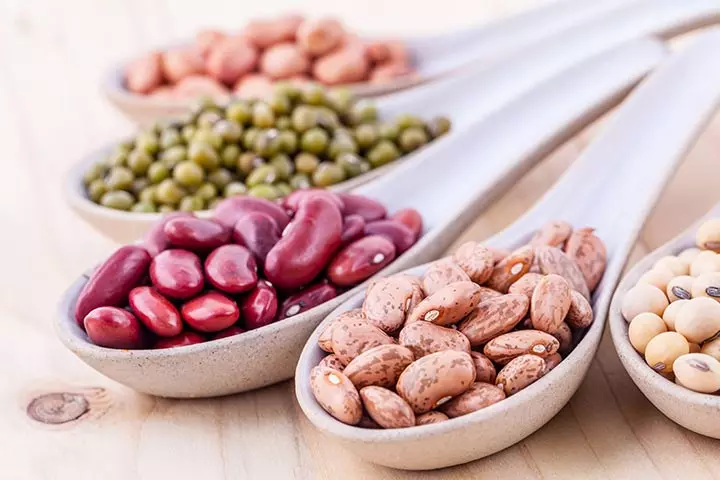
Legumes, including lentils, black beans, pinto beans, red kidney beans, are rich in protein and low in fat content (10). Most legumes contain a good amount of calcium and dietary fiber, essential for a growing child. You can try adding legumes to your kids’ meals for a protein, nutrient packed diet.
6. Leafy vegetables
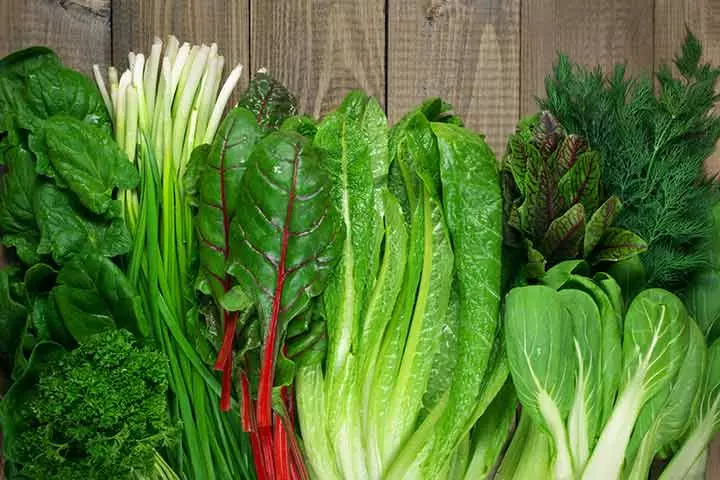
Leafy vegetables are a good source of calcium for children who do not consume milk due to lactose intolerance or dietary choices (11). Leafy vegetables are also a good source of vitamin K that is essential for bone health (12). Some of the calcium-rich leafy vegetables that can be added to your children’s daily diet are turnip greens, bok choy, kale, amaranth, collard greens, and watercress.
Consultant pediatrician Dr. Raashid Hamid says, “Foods like spinach and beans contain phytates and oxalates, which block calcium and iron absorption. Soaking, sprouting, or fermenting these foods reduces anti-nutrients, ensuring minerals critical for bone growth are fully utilized.”
7. Nuts
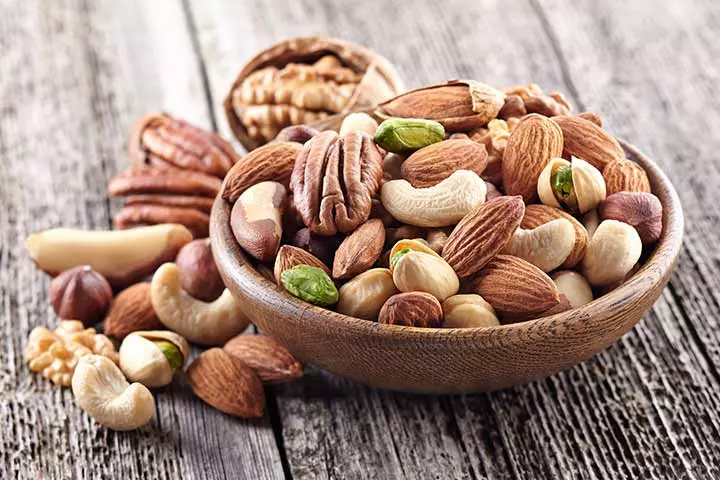
Nuts contain a mix of protein and calcium (13). Besides, they provide good amounts of omega-3 fatty acids that may improve bone and joint health (14). You can consider adding an assortment of nuts to the child’s diet. A few examples of nuts that contain the right amount of protein are almonds, pistachios, walnuts, and peanuts.
A blogger and mother of two from Malaysia shares a common Chinese belief about children’s height. She says, “It is a Chinese belief that making soup from the roots of the peanut/groundnut plant for children – usually male children – just before or round-about their puberty will help them reach their full height potential… Having a boy and a girl of my own, with my boy soon turning 12 and with his voice breaking now, my interest in the peanut root soup was rekindled.”
Sharing the recipe of her peanut root soup, she writes, ”I made my peanut root soup with the following ingredients (advised by friend): 1 bunch of peanut roots (fresh or dried); 1 black chicken (cut into large chunks); 7 black shitake mushrooms (the black ones Chinese use all the time); 1 liter of water; salt to taste.“
After washing the roots thoroughly, as well as washing and soaking the mushrooms beforehand, I put all the ingredients together and boiled for about 2 hours. My son didn’t mind the taste. It tasted rather earthy and “roasted” to me! (i).”
8. Seeds
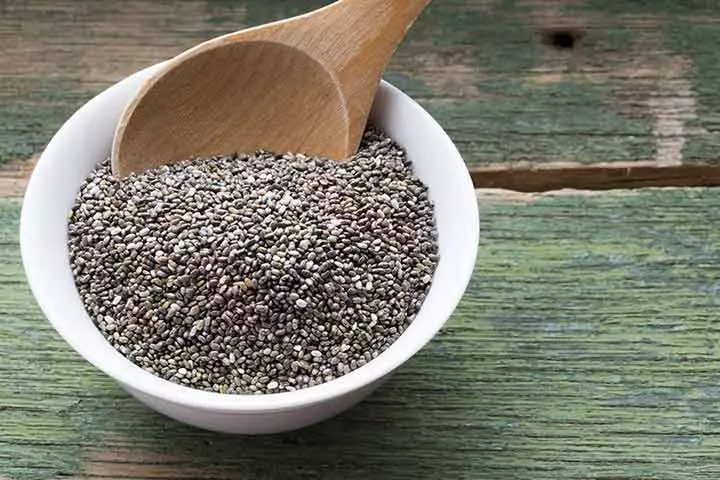
Most seeds contain protein, and some of them even contain minerals such as calcium. For example, chia seeds contain calcium (15). They are also high in omega 3 fatty acids and fiber. Other seeds like sesame seeds can be roasted or used raw in salads.
9. Grains
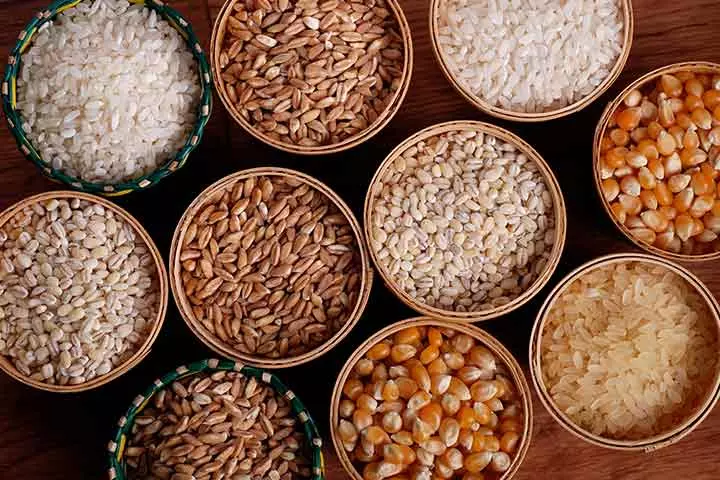
Grains may not contain much calcium but can be a source of magnesium, a mineral that plays an important role in promoting bone health (16). Include an assortment of grains in your child’s diet. Use whole grain that comes with the husk, a good source of fiber. Some of the whole grains that are a good source of calcium and magnesium are oats, barley, and pseudocerealsiPlants that produce edible seeds, which are nutritious alternatives to traditional grains but are not in the grass family (Poaceae) like buckwheat and quinoa.
10. Mineral-rich fruits

According to the US CDC’s Morbidity and Mortality Weekly Report 2025, nearly one-third (32%) of children between one and five years did not eat fruit daily in that year (17). Generally, fruits are not often associated with minerals, but some fruits contain an adequate amount of calcium and other minerals required for the healthy growth of the bones. Examples of fruits with calcium content are orange, apricot, kiwi, and pineapple (18) (19) (20) (21). So, include a wide variety of fruits in your children’s diet to attain optimum growth.
11. Soybean
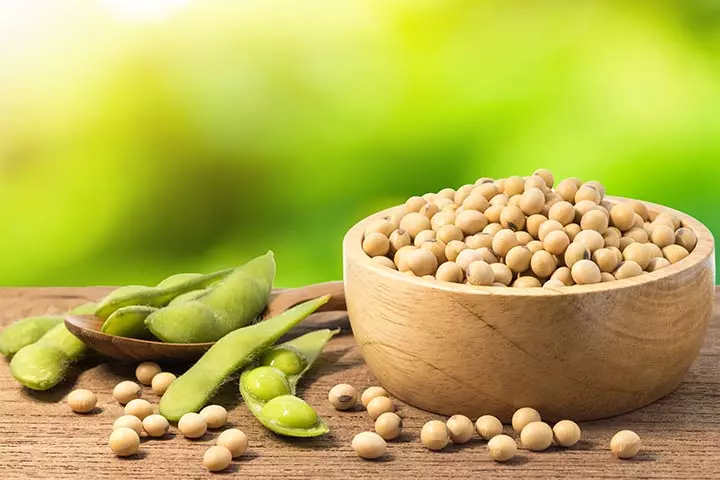
Include soy products, such as tofu and soy milk, in your child’s diet. Soybeans are high in protein, equivalent to animal protein (22). Soy products like tofu and soy milk are also high in calcium and magnesium. It makes an excellent protein source for vegans. Regular consumption of soy may help improve bone health (23). Soy is a common allergen, and individuals with soy allergies should avoid it.
 Point to consider
Point to considerA well-planned, balanced diet, regular exercise, and adequate sleep are crucial for your child’s growth and overall health. Moreover, these habits help keep chronic conditions like childhood obesity at bay. However, if you do not see any results, visiting a doctor would be advisable.
Tips On Planning Healthy Meals For Kids
Children are often picky eaters, making it challenging to establish healthy eating habits. Proper meal planning for kids involves creating meals with balanced nutrition, age-appropriate portion sizes, and foods that appeal to their tastes while being enjoyable. Here are some practical ways you can plan healthy and tasty meals for your children (24) (25):
- Include foods from different food groups in your child’s meals, including fruits, vegetables, and whole grains.
- Choose healthy snacks and dessert options, such as a trail mix, roasted nuts, and smoothies.
- Pick brightly colored fruits and vegetables like carrots, oranges, and grapes, as they are visually appealing to kids.
- Include plenty of lean protein and pair it with whole grains like oats and barley. Add healthy fats to make the meals wholesome.
- Limit highly processed foods that have excess sugar and salt.
- Plan and prepare meals in advance. For instance, you may cook some foods like pasta and soups in large portions and store them in a refrigerator.
- Serve age-appropriate portions to children and refrain from force-feeding.
- Involve your children in preparing and cooking meals to encourage healthy eating behavior.
- Offer a variety of foods each day or rotate meals to avoid monotony.
- Customize recipes per your child’s preferences. For example, if your child dislikes pumpkin, consider alternatives.
Other Lifestyle Factors That May Help Increase Height In Kids
In addition to well-balanced nutritious meals, some other lifestyle changes might help to increase height in kids include (26) (27):
- Engaging in regular physical activities, such as swimming and cycling.
- Ensuring adequate rest and sleep, which can positively influence the production of human growth hormone (hGH), essential for growth and development (28).
- Reducing mental stress or effectively managing stress levels in children.
- Limiting screen time, which the US CDC suggests can encourage outdoor play, improve sleep patterns, and enhance mental health, all of which may contribute to height growth (24).
- Reducing the intake of saturated fats, added sugars, and salt to encourage healthier eating habits (24).
- Avoiding sugary beverages, such as soda and soft drinks.
Reasons Why A Child Is Not Growing In Height
Your child’s height is an important marker of nutritional status and physical development (29). Besides genetic makeup and diet, there could be several other reasons for a child to exhibit delayed growth. Below are some possible reasons that are worth a check.
- Family’s short stature: Inherited genes from the parents significantly affect a child’s growth and development, especially, these inherited genes are responsible for 80% of an individual’s height (30) (31). So, if the parents, siblings, or close relatives are of short stature, the child may also inherit their short stature.
- Constitutional growth delay: Children with this condition grow at a normal rate. However, they are shorter than average. They usually exhibit delayed bone growth and tend to reach puberty late. Due to this, such children have a below-average height in the teenage years, but then they tend to catch up with their peers in adulthood (32).
- Growth hormone deficiency: Growth hormone (GH) is a hormone that helps in normal growth and development. In cases where a child has partial or complete GH deficiency, stunting is observed (33).
Quick fact
Growth hormone deficiency may either occur during infancy or later in childhood. The condition may be congenitaliConditions present at birth and are often hereditary or caused by genetic mutations or acquired (33). - Hypothyroidism: It is a common endocrineiThe system where glands produce hormones that controls all bodily functions, including metabolism and reproduction disorder caused by an underactive thyroid glandiA small gland located in the neck that produces hormones that regulate metabolism and energy levels . In hypothyroidism, the thyroid gland does not produce sufficient thyroid hormone, thus leading to conditions such as fatigue, weight gain, decreased growth, etc. (34).
- Turner syndrome: It is one of the common genetic conditions in girls caused by a complete or partial absence of the X chromosomeiA genetic structure found in cells that contains DNA and helps determine an organism's characteristics and traits during embryonic development. The most prominent features of the condition are short height and premature ovarian failure (35).
- Maternal health during pregnancy: Studies have shown that maternal nutrition, smoking history during pregnancy, or being exposed to any harmful substance when pregnant can influence their child’s height and growth (31).
- Socioeconomic status: A child growing up in poverty or in a low-income family is likely to face challenges such as poor nutrition, substandard living conditions, increased vulnerability to infectious diseases, and limited access to healthcare. These factors can negatively impact their overall health, growth, and development (31).
- Ethnicity: Ethnicity plays an important role in determining a child’s height. This could be due to varied geographical distributions, tribal origin, climate of the area, nutritional status, genetic makeup, and other factors (36).
Foods That Stunt Growth
Proper nutrition supports a child’s growth and height, while poor or inadequate nutrition can hinder it. Dr. Hamid opines, “Excessive calories, especially from sugary foods, can trigger early puberty, shortening the growth window.” Several nutritional factors that may impede growth in children include:
- Eating a diet low in zinc, vitamin A, vitamin D, and iron (37) can affect a child’s potential to gain height.
- Some studies show that a diet high in protein and carbohydrates might reduce the odds of being stunted among children (37).
- Research also suggests that consuming ultra-processed foods high in sugar and fat may negatively affect children’s growth. A study conducted on young rats revealed that consumption of such foods led to growth retardation, characterized by lesions in the tibial growth plates. This phenomenon was associated with significantly decreased bone mineral density and structural deterioration. Consequently, the entire bone exhibited inferior mechanical performance, elevating the risk of fractures (38).
These findings underscore the severe impact of consuming ultra-processed foods on the developing skeleton, emphasizing the need for awareness and dietary adjustments to promote healthy skeletal development in children. Ultra-processed foods include items like ice cream, ham, sausages, crisps, factory-made bread, breakfast cereals, biscuits, fizzy drinks, fruit-flavored yogurts, and instant soups (39).
Frequently Asked Questions
1. What should be done to promote height in children?
To promote height in children, it is important to ensure they receive proper nutrition. Therefore, it is recommended to follow dietary guidelines suitable for the child’s age and ensure they consume a balanced diet. Growth in children can be promoted by following good eating practices from a young age (40).
2. Can medicine increase children’s height?
Medical treatment can be a viable option to increase a child’s height if the growth stunt is caused by a medical disorder. Endocrine disorders and growth hormone deficiency are some conditions that may lead to stunted growth. In such cases, doctors may recommend daily or weekly hormone replacement therapy to promote height and help children reach their full growth potential (41).
3. Does growth hormone increase height in children?
Dr. Shoaib Malik, a preventative care specialist from New York City Metropolitan Area, opines, “In children, growth hormone deficiency can result in short stature. In such cases, treatment with growth hormone can increase the child’s height. However, it is important to note that growth hormone treatment is only recommended for children with growth hormone deficiency and not for those with normal hormone levels.”
4. How can I ensure my child gets enough protein?
Offer a variety of protein-rich foods such as eggs, chicken, beans, lentils, peas, broccoli, and dairy products such as milk, cheese, and yogurt (42). Include these in your child’s meals and snacks to meet daily protein needs. If you are uncertain about specific foods, consult a pediatrician to devise a diet plan tailored to your child’s age and preferences.
A child’s height is mostly dependent on their genetic makeup, and no matter how much one exercises, there is only so much one can do to increase their height. However, there are some foods to increase height in kids. A child needs a well-balanced diet with essential nutrients such as proteins, carbohydrates, vitamins, and minerals to attain proper growth. Milk, eggs, soybean, red meat, etc., are some examples of healthy foods that can help your child attain the maximum possible height. Despite eating a well-balanced diet, there may be certain underlying conditions if your child is not growing in height. You can contact your healthcare provider or a child nutritionist to get the necessary help for your child’s growth and development.
Infographic: Best Foods To Increase A Child’s Height
A well-balanced diet is essential to ensure a child’s proper growth and development. However, if you are worried that your little one is not attaining the recommended height at their respective age, fret not! In the following infographic, we have listed a few food items you might include in your child’s diet to help them grow. Read on!
Some thing wrong with infographic shortcode. please verify shortcode syntax
Illustration: Best Foods That Help Increase Height In Kids

Image: Stable Diffusion/MomJunction Design Team
Explore this video to uncover the top ten foods that can assist in achieving increased height. Learn which foods can help you reach your height goals.
Personal Experience: Source
MomJunction articles include first-hand experiences to provide you with better insights through real-life narratives. Here are the sources of personal accounts referenced in this article.
i. Peanut Root Soup for Growth;https://klgirlnowinipoh.blogspot.com/2013/02/peanut-root-soup-for-growth.html
References
- Physical changes during puberty; American Academy of Pediatrics
- Is height determined by genetics?; U.S. National Library of Medicine
- Short stature; U.S. National Library of Medicine
- Agneta Hornell et al.; Protein intake from 0 to 18 years of age and its relation to health: a systematic literature review for the 5th Nordic Nutrition Recommendations; National Center for Biotechnology Information
- Michael J. Puglisi and Maria Luz Fernandez; The Health Benefits of Egg Protein; NCBI
- Jamie I. Baum et al.; The effect of egg supplementation on growth parameters in children participating in a school feeding program in rural Uganda: a pilot study; National Center for Biotechnology Information
- 5 reason How to increase children’s heights to add eggs to the menu; University of Utah
- Michael J. Puglisi and Maria Luz Fernandez; , Effects of dairy products consumption on health; National Center for Biotechnology Information
- Macronutrients & Micronutrients; Pomana College
- All about beans nutrition, health benefits, preparation and use in menus; North Dakota State University
- Calcium: What’s best for your bones and health?; Harvard T.H. Chan
- Hip fractures and leafy vegetables; Tufts University
- How to eat nuts the healthy way; Harvard Medical School
- Naroa Kajarabille et al.; A New Insight to Bone Turnover: Role of ω-3 Polyunsaturated Fatty Acids; National Center for Biotechnology Information
- Chia Seeds | The Nutrition Source; HSPH
- Charles T Price et al.; Essential Nutrients for Bone Health and a Review of their Availability in the Average North American Diet; NCBI
- Heather C. Hamner et al.; Fruit, Vegetable, and Sugar-Sweetened Beverage Intake Among Young Children, by State — United States, 2025; Centers for Disease Control and Prevention MMWR
- Oranges, raw, navels; USDA
- Apricots, raw; USDA
- KIWIFRUIT; USDA
- Pineapple juice, canned, not from concentrate, unsweetened, with added vitamins A, C and E; USDA
- Soy; U.S. National Library of Medicine
- A. J. Lanou, Soy foods: Are they useful for optimal bone health?; National Center for Biotechnology Information
- Tips to Support Healthy Routines for Children and Teens; CDC
- Helping Your Child: Tips for Parents & Other Caregivers; NIH
- Your Child’s Growth; Nemours Children’s Health
- Shahla Vaziri Esfarjani et al.; (2025); Association between lifestyle and height growth in high school students; Journal of family medicine and primary care
- Does Sleeping Make You Taller?; Sleep Foundation
- Fafard St-Germain and Siddiqi; The Relation Between Household Food Insecurity and Children’s Height in Canada and the United States: A Scoping Review.; National Center For Biotechnology Information
- Factors that influence growth and development; Marquette University
- Is height determined by genetics?; MedlinePlus
- Constitutional Growth Delay; National Center For Biotechnology Information
- Growth Hormone Deficiency; Boston Children’s Hospita
- Hypothyroidism; The Children’s Hospital of Philadelphia
- Kateri McCarthy and Carolyn A Bondy; Turner syndrome in childhood and adolescence; National Center For Biotechnology Information
- Madhukar Mittal et al.; Short Stature: Understanding the Stature of Ethnicity in Height Determination; Indian journal of endocrinology and metabolism
- Fatemeh Esfarjani et al.; Major Dietary Patterns in Relation to Stunting among Children in Tehran, Iran; Journal of health, population, and nutrition
- Janna Zaretsky et al.; Ultra-processed food targets bone quality via endochondral ossification; Nature
- Ultra-processed foods: how bad are they for your health?; British Heart Foundation
- Poor Diets Damaging Children’s Health Worldwide; warns UNICEF; UNICEF
- Growth Problems; Boston Children’s Hospital
- Beyond Chicken Nuggets: Protein-Rich Alternatives for Picky Eaters; American Academy of Pediatrics
- Vitamins and Minerals for My Child; Indian Academy of Pediatrics
Community Experiences
Join the conversation and become a part of our nurturing community! Share your stories, experiences, and insights to connect with fellow parents.
Read full bio of Charmaine Dominguez
- Dr. Raashid Hamid is a consultant in the department of Pediatric Surgery at GMC hospital and associate professor of Pediatric and Neonatal Surgery at SKIMS, Jammu & Kashmir, India. He has four years of experience and specializes in general surgeries, including appendectomy, cholecystectomy, and exploratory laparotomy.
 Dr. Raashid Hamid is a consultant in the department of Pediatric Surgery at GMC hospital and associate professor of Pediatric and Neonatal Surgery at SKIMS, Jammu & Kashmir, India. He has four years of experience and specializes in general surgeries, including appendectomy, cholecystectomy, and exploratory laparotomy.
Dr. Raashid Hamid is a consultant in the department of Pediatric Surgery at GMC hospital and associate professor of Pediatric and Neonatal Surgery at SKIMS, Jammu & Kashmir, India. He has four years of experience and specializes in general surgeries, including appendectomy, cholecystectomy, and exploratory laparotomy. - Dr. Shoaib Malik is a physician with over 10 years of experience. He currently works at Prime Health of New Jersey and specializes in primary care and chronic disease management, including hypertension and diabetes. Dr. Malik studied medicine at Medical University of the America.
 Dr. Shoaib Malik is a physician with over 10 years of experience. He currently works at Prime Health of New Jersey and specializes in primary care and chronic disease management, including hypertension and diabetes. Dr. Malik studied medicine at Medical University of the America.
Dr. Shoaib Malik is a physician with over 10 years of experience. He currently works at Prime Health of New Jersey and specializes in primary care and chronic disease management, including hypertension and diabetes. Dr. Malik studied medicine at Medical University of the America.
Read full bio of Swati Patwal
Read full bio of Rohit Garoo
Read full bio of Dr. Joyani Das















